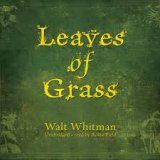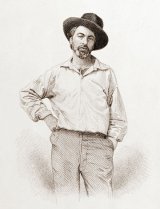Leaves of Grass Page #4
Leaves of Grass is a poetry collection by the American poet Walt Whitman (1819–1892). Although the first edition was published in 1855, Whitman spent most of his professional life writing and re-writing Leaves of Grass, revising it multiple times until his death. This resulted in vastly different editions over four decades—the first, a small book of twelve poems and the last, a compilation of over 400.
every city large and small, And employments! I will put in my poems that with you is heroism upon land and sea, And I will report all heroism from an American point of view. I will sing the song of companionship, I will show what alone must finally compact these, I believe these are to found their own ideal of manly love, indicating it in me, I will therefore let flame from me the burning fires that were threatening to consume me, I will lift what has too long kept down those smouldering fires, I will give them complete abandonment, I will write the evangel-poem of comrades and of love, For who but I should understand love with all its sorrow and joy? And who but I should be the poet of comrades? 7 I am the credulous man of qualities, ages, races, I advance from the people in their own spirit, Here is what sings unrestricted faith. Omnes! omnes! let others ignore what they may, I make the poem of evil also, I commemorate that part also, I am myself just as much evil as good, and my nation is--and I say there is in fact no evil, (Or if there is I say it is just as important to you, to the land or to me, as any thing else.) I too, following many and follow'd by many, inaugurate a religion, I descend into the arena, (It may be I am destin'd to utter the loudest cries there, the winner's pealing shouts, Who knows? they may rise from me yet, and soar above every thing.) Each is not for its own sake, I say the whole earth and all the stars in the sky are for religion's sake. I say no man has ever yet been half devout enough, None has ever yet adored or worship'd half enough, None has begun to think how divine he himself is, and how certain the future is. I say that the real and permanent grandeur of these States must be their religion, Otherwise there is just no real and permanent grandeur; (Nor character nor life worthy the name without religion, Nor land nor man or woman without religion.) 8 What are you doing young man? Are you so earnest, so given up to literature, science, art, amours? These ostensible realities, politics, points? Your ambition or business whatever it may be? It is well--against such I say not a word, I am their poet also, But behold! such swiftly subside, burnt up for religion's sake, For not all matter is fuel to heat, impalpable flame, the essential life of the earth, Any more than such are to religion. 9 What do you seek so pensive and silent? What do you need camerado? Dear son do you think it is love? Listen dear son--listen America, daughter or son, It is a painful thing to love a man or woman to excess, and yet it satisfies, it is great, But there is something else very great, it makes the whole coincide, It, magnificent, beyond materials, with continuous hands sweeps and provides for all. 10 Know you, solely to drop in the earth the germs of a greater religion, The following chants each for its kind I sing. My comrade! For you to share with me two greatnesses, and a third one rising inclusive and more resplendent, The greatness of Love and Democracy, and the greatness of Religion. Melange mine own, the unseen and the seen, Mysterious ocean where the streams empty, Prophetic spirit of materials shifting and flickering around me, Living beings, identities now doubtless near us in the air that we know not of, Contact daily and hourly that will not release me, These selecting, these in hints demanded of me. Not he with a daily kiss onward from childhood kissing me, Has winded and twisted around me that which holds me to him, Any more than I am held to the heavens and all the spiritual world, After what they have done to me, suggesting themes. O such themes--equalities! O divine average! Warblings under the sun, usher'd as now, or at noon, or setting, Strains musical flowing through ages, now reaching hither, I take to your reckless and composite chords, add to them, and cheerfully pass them forward. 11 As I have walk'd in Alabama my morning walk, I have seen where the she-bird the mocking-bird sat on her nest in the briers hatching her brood. I have seen the he-bird also, I have paus'd to hear him near at hand inflating his throat and joyfully singing. And while I paus'd it came to me that what he really sang for was not there only, Nor for his mate nor himself only, nor all sent back by the echoes, But subtle, clandestine, away beyond, A charge transmitted and gift occult for those being born. 12 Democracy! near at hand to you a throat is now inflating itself and joyfully singing. Ma femme! for the brood beyond us and of us, For those who belong here and those to come, I exultant to be ready for them will now shake out carols stronger and haughtier than have ever yet been heard upon earth. I will make the songs of passion to give them their way, And your songs outlaw'd offenders, for I scan you with kindred eyes, and carry you with me the same as any. I will make the true poem of riches, To earn for the body and the mind whatever adheres and goes forward and is not dropt by death; I will effuse egotism and show it underlying all, and I will be the bard of personality, And I will show of male and female that either is but the equal of the other, And sexual organs and acts! do you concentrate in me, for I am determin'd to tell you with courageous clear voice to prove you illustrious, And I will show that there is no imperfection in the present, and can be none in the future, And I will show that whatever happens to anybody it may be turn'd to beautiful results, And I will show that nothing can happen more beautiful than death, And I will thread a thread through my poems that time and events are compact, And that all the things of the universe are perfect miracles, each as profound as any. I will not make poems with reference to parts, But I will make poems, songs, thoughts, with reference to ensemble, And I will not sing with reference to a day, but with reference to all days, And I will not make a poem nor the least part of a poem but has reference to the soul, Because having look'd at the objects of the universe, I find there is no one nor any particle of one but has reference to the soul. 13 Was somebody asking to see the soul? See, your own shape and countenance, persons, substances, beasts, the trees, the running rivers, the rocks and sands. All hold spiritual joys and afterwards loosen them; How can the real body ever die and be buried? Of your real body and any man's or woman's real body, Item for item it will elude the hands of the corpse-cleaners and
Translation
Translate and read this book in other languages:
Select another language:
- - Select -
- 简体中文 (Chinese - Simplified)
- 繁體中文 (Chinese - Traditional)
- Español (Spanish)
- Esperanto (Esperanto)
- 日本語 (Japanese)
- Português (Portuguese)
- Deutsch (German)
- العربية (Arabic)
- Français (French)
- Русский (Russian)
- ಕನ್ನಡ (Kannada)
- 한국어 (Korean)
- עברית (Hebrew)
- Gaeilge (Irish)
- Українська (Ukrainian)
- اردو (Urdu)
- Magyar (Hungarian)
- मानक हिन्दी (Hindi)
- Indonesia (Indonesian)
- Italiano (Italian)
- தமிழ் (Tamil)
- Türkçe (Turkish)
- తెలుగు (Telugu)
- ภาษาไทย (Thai)
- Tiếng Việt (Vietnamese)
- Čeština (Czech)
- Polski (Polish)
- Bahasa Indonesia (Indonesian)
- Românește (Romanian)
- Nederlands (Dutch)
- Ελληνικά (Greek)
- Latinum (Latin)
- Svenska (Swedish)
- Dansk (Danish)
- Suomi (Finnish)
- فارسی (Persian)
- ייִדיש (Yiddish)
- հայերեն (Armenian)
- Norsk (Norwegian)
- English (English)
Citation
Use the citation below to add this book to your bibliography:
Style:MLAChicagoAPA
"Leaves of Grass Books." Literature.com. STANDS4 LLC, 2024. Web. 22 Dec. 2024. <https://www.literature.com/book/leaves_of_grass_23>.




Discuss this Leaves of Grass book with the community:
Report Comment
We're doing our best to make sure our content is useful, accurate and safe.
If by any chance you spot an inappropriate comment while navigating through our website please use this form to let us know, and we'll take care of it shortly.
Attachment
You need to be logged in to favorite.
Log In